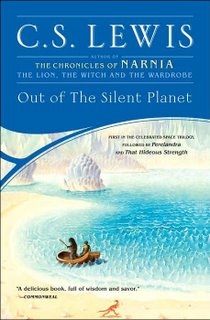C.S. Lewis: Evil Author or Evil Characters
 Last night, I finished up C.S. Lewis' Out of the Silent Planet, the first book in his space trilogy. The first time I read this book was way back in 1985, and I was a mere third-grader; and I hadn't read it again until this last weekend. I must admit that although I remembered the furry, otter-like hrossa and the altitudinous sorns, some of Lewis' finer theological points in the book had passed right over my head and left no impression on me whatever (at least as far as I can tell).
Last night, I finished up C.S. Lewis' Out of the Silent Planet, the first book in his space trilogy. The first time I read this book was way back in 1985, and I was a mere third-grader; and I hadn't read it again until this last weekend. I must admit that although I remembered the furry, otter-like hrossa and the altitudinous sorns, some of Lewis' finer theological points in the book had passed right over my head and left no impression on me whatever (at least as far as I can tell).I'm not going to write a review of the book here, or explain the theology which Lewis interweaved with the story; rather I wanted to report that I enjoyed it thoroughly, and can't wait to get to the next one. But the main reason I'm posting is to bring up a thought that came to me as I was reading it last night.
As I was becoming engrossed in this story and attached to the main characters, one of them whom I was coming to know and love (I won't tell you his/her name) was killed suddenly by an evil person. I didn't see it coming, and I was shocked and saddened. I was looking forward to getting to know this character better, and my hopes of seeing him/her live happily ever after were unexpectedly shattered. Later in the evening, it struck me that I was angry with the evil person, and blamed him thoroughly for taking away my newfound friend. However, it never occurred to me to be angry with C.S. Lewis, even though it was just as much his fault (if not more so) as the evil character's. Who killed my friend? Was it C.S. Lewis or the character who pulled the trigger? Strangely, the answer seems to be Both.
In the end, Lewis worked all things together for good... which reminds me of one of G.K. Chesterton's (I think) great quotes: "Any story without an evil character is an evil story."
Any thoughts?


1 Comments:
Thanks, Aaron. Those are good thoughts.
The thing that popped out to me upon reading your comment was this:
How silly it is to conceive of characters and a story existing without the presumption an author. The idea that there is no author seems so incredibly flawed; forget about whether or not you should be nauseated or exhilarated! How can you be any kind of essence that can worry about such things?
I'm not suggesting there is a one-to-one correlation between a written story and the cosmic story, but the similarities are striking. It's more of a parable, I guess.
The transcendental argument (I agree with you that it's more of a tautology than an argument) seems to fit well here:
Since there is a story with characters, setting, conflict, climax, and resolution, therefore there must have been an author who created it.
Oh wait, I guess this is the moral argument. The transcendental argument would say:
Since there is an author, there can be a story with characters, et al.
What do you think?
Post a Comment
<< Home